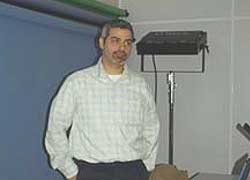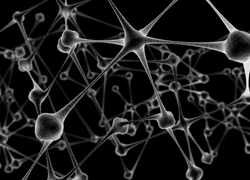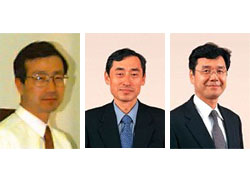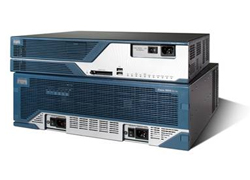IMDEA Networks

Event Category: External Presentation (External Speaker)
Mobile Communications Networks: Evolving through Biologically-Inspired Technologies
Mobile communications networks have been evolved through multiple technologies over a period of several decades, to a stage that they become very complicated in the context of resource control and management. The heterogeneous next generation mobile network (NGMN) now includes a variety of network technologies and topologies incorporating with one another to provide a wide range of services; operate in a variety of channel conditions and environments; and within a single universal end user device. NGMN will need to be offered as an integrated system, and to promote interoperability among networks, offer global coverage and seamless mobility, enable the use of a universal handheld terminal, and enhance service quality compared to current wired networks. NGMN will be the infrastructure of the true mobile Internet.
Read more arrow_right_altLow cost Network Coding for Collaborative Video Streaming
We focus on collaborative video streaming in wired overlay networks using low cost network codes. We propose a scheme that builds on both rateless codes and network coding in order to improve the system throughput and the video quality at clients. Our hybrid coding algorithm permits to efficiently exploit the available source and path diversity, without the need either for expensive routing or for scheduling algorithms.
Read more arrow_right_alt4GSensor, Paradigms for the Next Generation Wireless Sensor Networks
If you would like more information about Dr. Tiago Camilo, please visit his Linkedin profile: http://www.linkedin.com/in/tiagocamilo
More information about Nokia Siemens Networks
Read more arrow_right_altESNOG/GORE 2012 - Networking event
On Wednesday, the 13th of November, will take place the next meeting of ESNOG/GORE (España Network Operators Group / Grupo de Operadores de Red Españoles), at the Polytechnic School (Leganés Campus) of the University Carlos III of Madrid (UC3M). The meeting is sponsored by the Cátedra Telefónica de la UC3M and ESPANIX (Punto neutro Español de Internet). This is a workshop that will schedule a series of lectures and panel discussions on Internet at the network level.
Read more arrow_right_altAdvanced Computer Networks
This seminar builds on your basic knowledge of computer networks from an introductory computer networks class or equivalent. It covers mathematical and algorithmic foundations of the essential networking functions of data transfer, transfer control, and management. Essential concepts of some techniques, such as optimization, control theory, queuing theory, and their application to networks are covered.
Read more arrow_right_altPresentation of research lines
Dr. Kenichi Mase, Dr. Toshini Tsuboi and Dr. Hiromi Ueda will visit Institute IMDEA Networkson Monday September 20th and will take the opportunity to present their research lines. The overall talk will last about 45 minutes, including questions and answers, and it will be divided in the following three 15 minute slots:
Read more arrow_right_altAn Algebraic Approach to Internet Routing
A great deal of of interesting work was done in the 1970s in generalizing shortest path algorithms to a wide class of semirings also called "path algebras" or "dioids". Although the evolution of Internet Routing protocols does not seem to have taken much inspiration from this work, recent "reverse engineering" efforts have demonstrated that an algebraic approach is very useful for both understanding existing protocols and for exploring the design space of future Internet routing protocols. This course is intended teach participants the basic concepts needed to understand this approach. No previous background will be assumed.
Read more arrow_right_altRouters and Networks with Near-Zero Buffers
It this talk I will start with a brief overview of the research activities of our group at the University of New South Wales, Sydney, Australia, in the areas of core network switching, body area networking, and security for wireless sensor networks. I will then focus on the specific problem of sizing buffers in core routers, highlighting constraints posed by power consumption and optical storage technology. We investigate the impact of router buffer size on the characteristics of TCP traffic and its co-existence with open-loop traffic. We propose and analyze the efficacy of techniques such as traffic conditioning and forward error correction in managing contention loss in the network core. Finally, we speculate on the feasibility of a future Internet core with near-zero buffers.
Read more arrow_right_alt
Unbounded Contention Resolution in Multiple-Access Channels
A frequent problem in settings where a unique resource must be shared among users is how to resolve the contention that arises when all of them must use it, but the resource allows only for one user each time. The application of efficient solutions for this problem spans a myriad of settings such as radio communication networks or databases.
Read more arrow_right_altStability in Networks with Aggregate Schedulers
Some among the most widespread applications of the Internet (real-time streaming multimedia applications) are based on packet exchanges that assume a very low packet delay. In order to offer some form of better service to this kind of traffic some architectural frameworks have been proposed, in which traffic sources obey some form of constraints on the maximum number of packets sent in every time interval, in which traffic is subdivided into classes, and where at any node all packets are served taking only into account the class to which they belong to. For these networks an open issue is their stability, that is the possibility to derive finite bounds to packet delay and queue size at each node.
Read more arrow_right_alt











Recent Comments